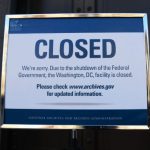Wilmington officials have asked to join the civil rights groups suing Delaware for underfunding educational services for students with disabilities, students from low-income families and English Language Learners. Part of the lawsuit involves how counties calculate property taxes, which contribute to school funding. Wilmington hopes to force New Castle County to update its property tax assessments for the first time in 35 years, claiming the current system imposes excessive costs on city residents.
Gov. John Carney recently signed legislation allowing furloughed and unpaid federal employees living in Delaware to apply for a temporary suspension of rent; health, life and disability insurance premiums; and other debt obligations for the duration of the government shutdown. Legislation to provide federal employees state-guaranteed, low-interest loans failed to pass by one vote in the Senate. An estimated 1,000 Delawareans with disabilities are in the federal workforce.
With a majority in the House of Representatives and control of committees, Democrats plan to use their oversight powers to publicly scrutinize controversial regulations Education Secretary Betsy DeVos has issued. Among the decisions Democratic representatives say they want to examine are the revocation of discipline guidelines regarding disproportionate punishment of students with disabilities and the transfer of funds to private charter schools from public schools serving large populations of students with disabilities.
The New York state comptroller, who controls the New York state pension fund, recently added disability employment to the list of social and environmental justice issues he expects companies receiving pension fund money to address. As the pension fund is a major investor in companies such as Nike, Apple and McDonald’s, the comptroller’s decision makes disability employment a necessary consideration for some of the world’s biggest corporations.
The government shutdown threatens access to paychecks, food and shelter for people with disabilities, family members and care providers. People with disabilities comprise 14 percent of the federal workforce, while many other federal workers are family caregivers. Next week they will miss their second straight paycheck. People with disabilities with low income risk losing access to housing subsidies and food stamps.





